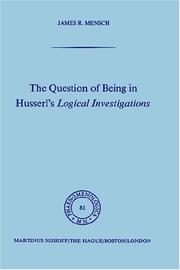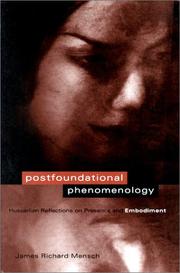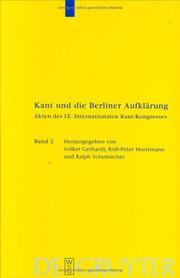| Listing 1 - 10 of 10 |
Sort by
|

ISBN: 9024724139 9048182646 9401734461 9789024724130 Year: 1981 Volume: 81 Publisher: The Hague: Nijhoff,
Abstract | Keywords | Export | Availability | Bookmark
 Loading...
Loading...Choose an application
- Reference Manager
- EndNote
- RefWorks (Direct export to RefWorks)
This study proposes a double thesis. The first concerns the Logische Untersuchungen itself. We will attempt to show that its statements about the nature of being are inconsistent and that this inconsis tency is responsible for the failure of this work. The second con cerns the Logische Untersuchungen's relation to the Ideen. The latter, we propose, is a response to the failure of the Logische Untersuchungen's ontology. It can thus be understood in terms of a shift in the ontology of the Logische Untersuchungen, a shift motivated by the attempt to overcome the contradictory assertions of the Logische Untersuchungen. In this sense our thesis is that, in the technical meaning that Husserl gives the term, the Logische Untersuchungen and the Ideen can be linked via a "motivated path. " We can, by way of an introduction, clarify our theses by regard ing three elements. The first is the relation of epistemology to ontology. The second is the notion of motivation as Husserl conceives the term. The third is the fundamental distinctions that are to be explained via the notion of motivation. 1. We should begin by remarking that the goal of the Logische Untersuchungen is explicitly epistemological; it is that of answer ing "the cardinal question of epistemology, the question concerning the objectivity of knowledge" (LU, Tub. ed. , I, 8; F. , p. 56V For Husserl, his other questions - i. e.
Metaphysics --- Husserl, Edmund --- Philosophy, German --- Logic --- Knowledge, Theory of --- Phenomenology --- Ontology --- Philosophie allemande --- Logique --- Théorie de la connaissance --- Phénoménologie --- Ontologie --- History --- Histoire --- Husserl, Edmund, --- 111.1 --- Academic collection --- Philosophy, Modern --- Epistemology --- Theory of knowledge --- Philosophy --- Psychology --- Argumentation --- Deduction (Logic) --- Deductive logic --- Dialectic (Logic) --- Logic, Deductive --- Intellect --- Science --- Reasoning --- Thought and thinking --- Metafysica: zijnsbegrip; ontologie:--algemeen --- Methodology --- Knowledge, Theory of. --- Logic. --- Phenomenology. --- 111.1 Metafysica: zijnsbegrip; ontologie:--algemeen --- Théorie de la connaissance --- Phénoménologie --- Husserl, Edmond --- Husserl, Edmund, - 1859-1938 - Logische Untersuchungen --- Ontology.

ISBN: 0271020474 9780271020471 Year: 2001 Publisher: University Park (Pa.): Pennsylvania state university press,
Abstract | Keywords | Export | Availability | Bookmark
 Loading...
Loading...Choose an application
- Reference Manager
- EndNote
- RefWorks (Direct export to RefWorks)
Theory of knowledge --- Husserl, Edmund --- Body, Human (Philosophy) --- Self (Philosophy) --- History --- -Self (Philosophy) --- -Philosophy --- Philosophy --- -History --- -Husserl, Edmund --- -Contributions in philosophy of experience --- -Body, Human (Philosophy) --- Husserl, Edmond --- Contributions in philosophy of experience --- Human body (Philosophy) --- Husserl, Edmund, --- Body, Human (Philosophy) - History - 20th century. --- Self (Philosophy) - History - 20th century.
Book
ISBN: 9780874628012 0874628016 Year: 2010 Volume: 70 Publisher: Milwaukee ( Wis.): Marquette university press,
Abstract | Keywords | Export | Availability | Bookmark
 Loading...
Loading...Choose an application
- Reference Manager
- EndNote
- RefWorks (Direct export to RefWorks)
Having asked, What, then, is time? Augustine admitted, I know well enough what it is, provided that nobody asks me; but if I am asked what it is and try to explain, I am baffled. We all have a sense of time, but the description and explanation of it remain remarkably elusive. Through a series of detailed descriptions, Husserl attempted to clarify this sense of time. This book traces the development of his account of our temporal self-awareness, starting with his early 1905-1909 lectures on time consciousness and proceeding through the 1917-18 Bernau Manuscripts, the Analyses of Passive Syntheses of the 1920s and ending with the C, B and E manuscripts on time and instincts of the 1930s. Although it covers all the stages of Husserls account of temporality, the book is nonetheless systematic in its approach. It is organized about a number of basic topics in the theory of time and presents and critically appraises Husserls positions on the issues pertaining to each.
Time perception --- Husserl, Edmund, --- Chronometry, Mental --- Duration, Intuition of --- Intuition of duration --- Mental chronometry --- Time --- Time, Cognition of --- Time estimation --- Orientation (Psychology) --- Perception --- Husserl, Edmund --- Husserl, Edmond --- Husserl, Edmund, - 1859-1938
Book
ISBN: 9789004375833 9789004375840 Year: 2018 Publisher: Leiden ;Boston Brill
Abstract | Keywords | Export | Availability | Bookmark
 Loading...
Loading...Choose an application
- Reference Manager
- EndNote
- RefWorks (Direct export to RefWorks)
Book
ISBN: 9783031261466 3031261461 9783031261473 303126147X Year: 2023 Publisher: Cham : Springer Nature Switzerland : Imprint: Springer,
Abstract | Keywords | Export | Availability | Bookmark
 Loading...
Loading...Choose an application
- Reference Manager
- EndNote
- RefWorks (Direct export to RefWorks)
This text examines the many transformations in Husserl’s phenomenology that his discoveries of the nature of appearing lead to. It offers a comprehensive look at the Logical Investigations’ delimitation of the phenomenological field, and continues with Husserl’s account of our consciousness of time. This volume examines Husserl’s turn to transcendental idealism and the problems this raises for our recognition of other subjects. It details Husserl’s account of embodiment and takes largely from his manuscripts, both published and unpublished, dealing with his theory of instincts, his considerations of mortality and the teleological character of our existence. This book appeals to students and researchers and presents a genetic account of our selfhood, one that unifies Husserl’s different claims about who and what we are.
Phenomenology. --- Husserl, Edmund, --- Academic collection --- Phenomenology --- Logic --- Philosophy --- History of Philosophy --- Husserl, Edmund, - 1859-1938 --- Theory of knowledge --- Husserl, Edmund --- Logic. --- History of Philosophy. --- History.
Multi
ISBN: 9783031261473 9783031261466 9783031261480 9783031261497 3031261461 Year: 2023 Publisher: Cham Springer Nature Switzerland :Imprint: Springer
Abstract | Keywords | Export | Availability | Bookmark
 Loading...
Loading...Choose an application
- Reference Manager
- EndNote
- RefWorks (Direct export to RefWorks)
This text examines the many transformations in Husserl's phenomenology that his discoveries of the nature of appearing lead to. It offers a comprehensive look at the Logical Investigations' delimitation of the phenomenological field, and continues with Husserl's account of our consciousness of time. This volume examines Husserl's turn to transcendental idealism and the problems this raises for our recognition of other subjects. It details Husserl's account of embodiment and takes largely from his manuscripts, both published and unpublished, dealing with his theory of instincts, his considerations of mortality and the teleological character of our existence. This book appeals to students and researchers and presents a genetic account of our selfhood, one that unifies Husserl's different claims about who and what we are.
Philosophy --- Logic --- History of philosophy --- filosofie --- geschiedenis --- existentialisme --- logica --- Theory of knowledge --- Husserl, Edmund --- Phenomenology. --- Husserl, Edmund,
Book
ISBN: 9783031687006 9783031687013 3031687019 Year: 2024 Publisher: Cham Springer
Abstract | Keywords | Export | Availability | Bookmark
 Loading...
Loading...Choose an application
- Reference Manager
- EndNote
- RefWorks (Direct export to RefWorks)
Multi

ISBN: 9780823293148 9780823224968 Year: 2022 Publisher: New York, N.Y. Fordham University Press
Abstract | Keywords | Export | Availability | Bookmark
 Loading...
Loading...Choose an application
- Reference Manager
- EndNote
- RefWorks (Direct export to RefWorks)
Digital

ISBN: 9783050056890 9783050051932 Year: 2012 Publisher: Berlin Akademie Verlag
Abstract | Keywords | Export | Availability | Bookmark
 Loading...
Loading...Choose an application
- Reference Manager
- EndNote
- RefWorks (Direct export to RefWorks)


ISBN: 9783110874129 9783110169799 Year: 2014 Publisher: Berlin ;; Boston De Gruyter
Abstract | Keywords | Export | Availability | Bookmark
 Loading...
Loading...Choose an application
- Reference Manager
- EndNote
- RefWorks (Direct export to RefWorks)
| Listing 1 - 10 of 10 |
Sort by
|

 Search
Search Feedback
Feedback About UniCat
About UniCat  Help
Help News
News